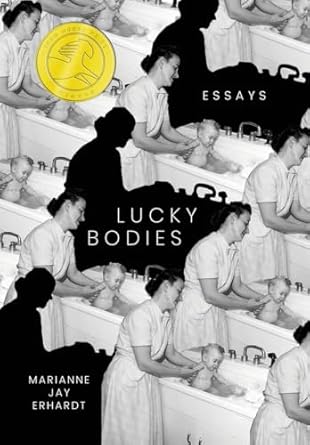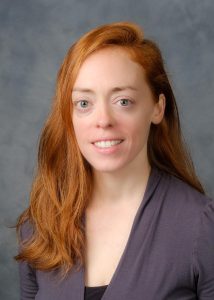Behind the Book: Q&A with Marianne Erhardt
By Erin Marlow, Communications Specialist in the Office of the Dean of the College
Marianne Erhardt, Associate Teaching Professor of Writing at Wake Forest University, recently published her collection of essays, Lucky Bodies, with Texas Tech University Press. Weaving together personal anecdotes and explorations of caregiving across cultural narratives and literature, Erhardt offers a heartfelt meditation on the complexities of motherhood.
Erhardt recently spoke with the Dean’s Office about Lucky Bodies and her writing process.
What inspired you to write this collection of essays?
This book is concerned with motherhood, care, and the stories that shape our notions of what it means to be a mother or caregiver. About 10 years ago, I was reading a book to my then-toddler son. The book was Blueberries for Sal by Richard McCloskey, one of my own childhood favorites. He asked me, “What is the mother’s name?” We looked together and found that she did not have one besides “Mother.” We looked through other books on his nightstand and found that none of the mothers within were named. This inspired the first essay I wrote for the project, “Blueberry Hill,” where I set out to re-imagine and name this mother figure. Once I wrote that first essay, I knew I had started a series, and, eventually, I realized I was writing a book.
What was a major challenge that you faced in your writing process?
About half of these essays were written when my kids were really small. Time was (and is) always the challenge. Finding time to write between work and raising kids. Also writing from within that particular magic and exhaustion that comes with small children. I wanted to get things on the page while I was experiencing it. So much about parenthood is fleeting. I also wanted to just be present with my kids. It’s a tension that many parents feel: wanting to notice/hold on/understand without compromising your full presence.
What would you say is your project’s unique contribution to the field? Larger society?
This is an academic question, and I have a very non-academic answer.
This project is unique because it’s emerging from one particular person and the constellation of stories that charm and haunt that person as she moves through life, trying to learn how to best provide and receive care.
One way is to tell more stories. This includes honest depictions of pregnancy, birth, and motherhood. This includes returning to the origin stories of our personal and cultural ideas and ideals of motherhood and care. We need to embrace some stories; we need to discard others. Some we need to reimagine and rewrite.
Do you involve students in your writing work? How do you bring your writing into the classroom?
There are times when I find teaching and writing directly supporting one another. When I was starting a new project written in very short essays, I found myself developing a new class, WRI390 Short Forms, where I got to play and think about flash nonfiction and other short forms alongside bright and eager students. When I taught a First Year Seminar on Storytelling and Moral Imagination, we studied Aesop’s Fables, which I’d never looked at closely before. This work led me to fall in love with a particular fable (“The Lark and Her Crest”) which is the root story for the final essay in my book.
In addition, I often share my own writing and publishing experiences (and frustrations!) with students. I’ve shown them drafts of my work, full of editor’s comments. I’ve shown them my list of rejected submissions.
What’s next? Do you see your work evolving for future publications?
I have a couple of projects in the works. The first is a memoir written in flash, or very short essays. It’s primarily about brothers and sisters. I’m one of seven siblings, so there are many permutations of stories, dynamics, and perceived truths among us. I’m currently revising it for an interested publisher.
The second project is very new. It’s about the heart. But then everything I write is about the heart, I suppose.
Lucky Bodies


We need to embrace some stories; we need to discard others. Some we need to reimagine and rewrite.
Marianne Erhardt

